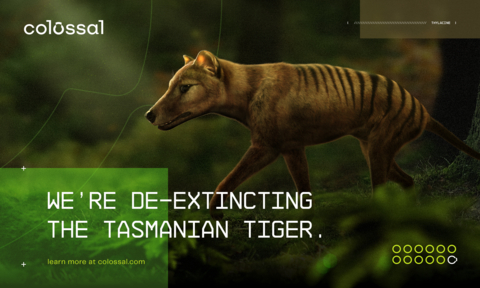DALLAS– Colossal Biosciences, a breakthrough genetic engineering and de-extinction company, announces it has started the de-extinction of the thylacine, a beloved Australian marsupial that was eradicated by human hunting nearly a century ago. Commonly known as the Tasmanian tiger, the slim, striped keystone species was native to Australia, including Tasmania and New Guinea and had previously roamed the Earth for millions of years. This is the second announced animal de-extinction project from Colossal, which uses breakthrough gene-editing technologies for a new wave of wildlife and ecosystem conservation.
Bringing back the thylacine will not only return the iconic species to the world, but has the potential to re-balance the Tasmanian and broader Australian ecosystems, which have suffered biodiversity loss and ecosystem degradation since the loss of the predator earlier this century. Research shows Australia has the worst mammalian extinction rate in the world. Without an apex predator, ecosystems plunge into a series of cascading trophic downgrading effects, leading to the spread of disease, an increase in wildfires and invasive species, a reduction in carbon sequestration, and a disruption to natural biogeochemical cycles. The thylacine played a critical role in regulating the ecosystem by hunting non-native mesopredators, which prey on native herbivores. When the native herbivores disappear, the natural vegetation changes, transforming the landscape and creating a vicious cycle of degradation.
With the collaboration of local partners, rewilding the thylacine to select areas in Australia and Tasmania could have a top-down effect on restoring the balance to ecosystems, helping return the area to its natural state before the marsupial went extinct as the result of a combination of human poaching and the introduction of non-native predators.
Colossal previously announced its plans to de-extinct the woolly mammoth and restore the keystone species to the Arctic Tundra last September. The woolly mammoth restoration team now has over 35 dedicated scientists spanning various functional areas including cell engineering, stem cell biology, embryology, computational biology, and genome engineering as well as three laboratories focused on the mission for mammoth de-extinction. Colossal is assembling an expert thylacine team and is near completion of its new dedicated thylacine laboratory.
In Colossal’s continued collaboration with leading universities and supporting scientific research, Colossal has partnered with the University of Melbourne and its Thylacine Integrated Genetic Restoration Research Lab, headed up by Andrew Pask Ph.D., the leading marsupial evolutionary biologist and world’s foremost Tasmanian tiger expert. In addition to the collaboration, Pask has also joined Colossal’s prestigious Scientific Advisory Board bringing a wealth of knowledge to the company around marsupial gestation and evolution. Pask joins such industry luminaries as Beth Shapiro Ph.D., Love Dálen Ph.D., Thomas Hildebrandt Ph.D., Kenneth Lacovara Ph.D., Carolyn Bertozzi Ph.D,. and Paul Ling Ph.D. among others.
“We’re thrilled to be collaborating with Andrew Pask and the University of Melbourne to restore this amazing animal to Earth while also further developing gestational and genetic rescue technologies for future marsupial conservation efforts,” said Ben Lamm, Colossal Co-Founder and CEO. “With our planet’s biodiversity at risk, we will continue to contribute scientific resources to preserving the species and ecosystems necessary to sustain life.”
“This is a landmark moment for marsupial research and we’re proud to team up with Colossal to make this dream a reality,” Dr. Pask said. “The technology and key learnings from this project will also influence the next generation of marsupial conservation efforts. Additionally, rewilding the thylacine to the Tasmanian landscape can significantly curb the destruction of this natural habitat due to invasive species. The Tasmanian tiger is iconic in Australian culture. We’re excited to be part of this team in bringing back this unique, cornerstone species that mankind previously eradicated from the planet.”
The standardization of marsupial biobanking will revolutionize the amount of scientific resources available to all extant species belonging to this non-model group of organisms. The successful birth of the thylacine requires advancement of current marsupial assisted reproductive technology, leading to the development of gestation and maturation devices to help conserve any marsupial.
“We are excited about the applications of these technologies in being able to conserve marsupial species that are on the brink of extinction before we lose them forever,” said Barney Long, senior director of conservation strategies for Re:wild.
This technology will be instrumental in the preservation of marsupials at large, which are highly concentrated on Australia, the country with the fastest rate of loss of biodiversity.
“Andrew and his lab have made tremendous advances in marsupial research, gestation, thylacine imaging, and tissue sampling. Colossal is excited to provide the necessary genetic editing technology and computational biology to bring this project, and the thylacine, to life. It’s an incredible collaboration and project with far reaching benefits for animal conservation efforts at large,” said Dr. George Church, Colossal Co-Founder and a world-recognized leader in genomics.
“Colossal is propelling the scientific community forward by spearheading the current approach to de-extinction,” said Thomas Tull, lead investor in Colossal. “I am proud to support the vision of Ben Lamm, Dr. George Church and the world-class scientists on Colossal’s Board as they develop thoughtful and innovative solutions that have the potential to influence the future of pharmacology and genetics, as well as create a lasting environmental and social impact.”


